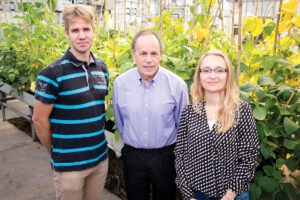
Researchers report in the journal Science that they can increase plant productivity by boosting levels of three proteins involved in photosynthesis. In field trials, the scientists saw increases of 14 to 20 percent in the growth of their modified tobacco plants. The work confirms that photosynthesis can be made more efficient to increase plant yield, a hypothesis some in the scientific community once doubted was possible.
The team targeted a process plants use to shield themselves from excessive solar energy. “Crop leaves exposed to full sunlight absorb more light than they can use,” said University of Illinois plant biology and crop sciences professor Stephen Long, who led the study with postdoctoral researchers Katarzyna Glowacka and Johannes Kromdijk.
“Plants protect themselves by making changes within the leaf that dissipate the excess energy as heat,” he said. “This process is called nonphotochemical quenching.
“But when a cloud crosses the sun, or a leaf goes into the shade of another, it can take up to half an hour for that NPQ process to relax,” Long added. Calculations revealed “surprisingly high losses” of 7.5 to 30 percent. The study suggested that boosting levels of three proteins might speed up the recovery process. Two of the modified plant lines consistently showed 20 percent higher productivity. Other experiments have demonstrated that increasing photosynthesis by exposing plants to high carbon dioxide results in more seeds in wheat, soy and rice, he said.
Source: Diana Yates, Life Sciences Editor









